In an era where climate change and environmental sustainability are paramount concerns, the G20, a group of the world’s largest economies, has set forth a visionary goal – to triple renewable energy capacity by 2030. This ambitious target is not only a testament to the urgency in addressing the climate crisis but also a remarkable step towards shaping a sustainable future.
Renewable energy, a term often associated with wind, solar, hydro, and geothermal power, is at the forefront of the global effort to combat climate change. These sources of clean energy offer a promising solution to reduce greenhouse gas emissions and transition away from fossil fuels that have been the primary drivers of environmental degradation. The G20’s commitment to tripling renewable energy capacity by 2030 signals a substantial shift in the way energy is produced and consumed on a global scale.
But what does this commitment entail, and why is it so vital for our planet’s future?
The Urgency of Renewable Energy
The urgency for renewable energy cannot be overstated. As the planet grapples with the adverse effects of global warming, including rising temperatures, extreme weather events, and sea-level rise, the need for sustainable energy alternatives is crystal clear. Transitioning to renewable energy sources is a critical component of international efforts to limit global warming to well below 2 degrees Celsius, as stipulated in the Paris Agreement.
Renewable energy technologies are not only eco-friendly but also economically sound. They offer numerous benefits, including reducing air pollution, creating jobs, and enhancing energy security. In addition, they are sustainable, meaning they can provide energy for generations without depleting finite resources.
G20’s Pledge: A Game-Changer
The G20’s commitment to tripling renewable energy capacity is a game-changer for several reasons:
Global Influence: The G20 comprises the world’s largest economies, responsible for the majority of global carbon emissions. Their collective pledge carries significant weight in shaping international policy and encouraging other nations to follow suit.
Accelerating Transition: By setting a specific target to triple renewable energy capacity, the G20 accelerates the transition to clean energy. This not only reduces carbon emissions but also stimulates innovation and investment in the renewable energy sector.
Economic Opportunities: Investing in renewable energy creates job opportunities, fosters technological innovation, and bolsters economic growth. The G20’s commitment not only benefits the environment but also strengthens economies.
Energy Security: Renewable energy sources, unlike fossil fuels, are not subject to the volatility of global energy markets. By diversifying their energy portfolios, G20 nations enhance their energy security.
Challenges Ahead
While the G20’s commitment to renewable energy is commendable, it is not without challenges. Expanding renewable energy capacity on such a scale requires substantial investment, infrastructure development, and policy coordination. Additionally, transitioning from fossil fuels to renewables can be a complex process and may face resistance from vested interests.
However, the rewards are worth the effort. Tripling renewable energy capacity by 2030 will significantly contribute to achieving climate goals, reducing air pollution, and creating a more sustainable energy landscape. It will also serve as an example for other nations to follow, fostering a global transition to clean energy.
The G20’s aim to triple renewable energy capacity by 2030 is not just a pledge but a commitment to the future of our planet. It signifies a paradigm shift in the global energy sector, with a stronger focus on sustainability, clean air, and thus work towards creating a safer climate for generations to come. As we navigate the complexities of climate change, this ambitious goal offers hope and a concrete plan for a greener, more sustainable future.
References:
- Understanding G20’s aim to triple renewable energy capacity by 2030 | Economic Times | Sep 2023
- G20 aims to triple renewables by 2030, gives caveat to fossil fuels | Business Standard | Sep 2023
- G20 agrees to pursue tripling renewables capacity but stop short of major goals | Reuters | Sep 2023
You might also be interested to read: Future of Reskilling: Embracing Unlearning and Retraining for Tomorrow’s Workforce





